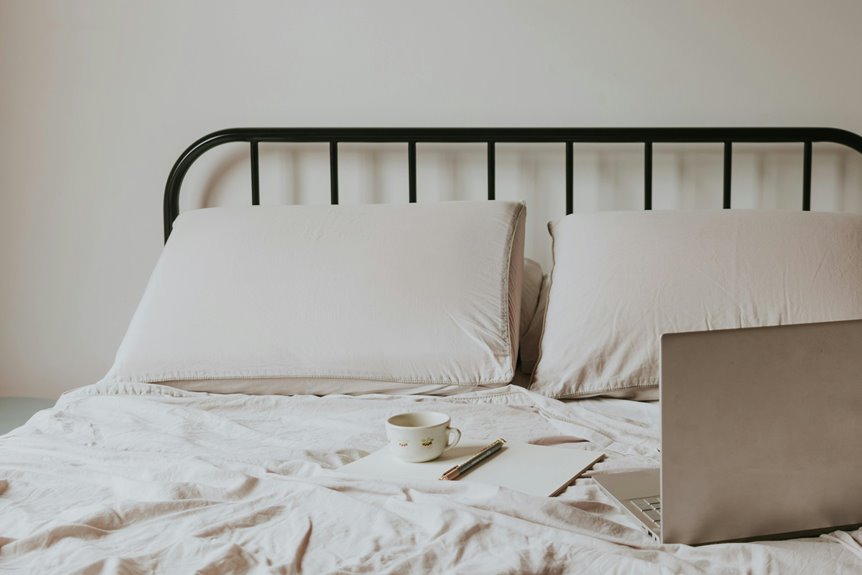How Coffee Affects Your Sleep: What You Should Know

If you enjoy your morning cup of coffee, you might not realize how its caffeine content can influence your sleep patterns. Caffeine blocks adenosine, a key player in promoting sleepiness, which can lead to disrupted sleep if consumed too late in the day. But how does timing and individual sensitivity factor in? Understanding these elements can help you make more informed choices about your coffee habits and their impact on your rest.
Understanding Caffeine: The Science Behind Its Effects
When you consume caffeine, it quickly enters your bloodstream and starts to affect your body, primarily by blocking the action of adenosine, a neurotransmitter that promotes sleepiness.
Your body’s caffeine metabolism varies, influencing how quickly you feel its effects.
Over time, you may develop caffeine tolerance, requiring higher doses to achieve the same stimulating effects, ultimately impacting your sleep quality.
The Timing of Your Coffee Consumption
When you drink coffee can greatly influence your sleep quality.
Caffeine has a half-life of about 5 to 6 hours, meaning its effects linger long after your last cup.
To optimize your rest, consider limiting coffee consumption to earlier in the day.
Optimal Drinking Hours
Although many people reach for their morning cup of coffee to kickstart their day, the timing of your consumption can greatly impact your sleep quality.
For best results, aim to enjoy your coffee in the morning, ideally within the first few hours after waking.
Avoid drinking caffeine in the late afternoon, as it can inhibit your ability to fall asleep later.
Caffeine Half-Life Impact
The timing of your coffee consumption is greatly influenced by caffeine’s half-life, which is the duration it takes for your body to eliminate half of the caffeine you’ve ingested.
Individual caffeine metabolism varies, affecting how long caffeine stays in your system. If you have higher caffeine tolerance, you might drink coffee later, but be cautious—this can interfere with your sleep quality.
How Much Caffeine Is Too Much?
How can you determine the right amount of caffeine without risking your sleep quality?
Generally, up to 400 mg daily is safe for most adults, but individual caffeine tolerance varies.
Monitor your body’s reactions; if you experience withdrawal symptoms like headaches or irritability when cutting back, you might be consuming too much.
Adjust your intake gradually to find your ideal balance.
Coffee and Its Impact on Sleep Stages
When you consume coffee, caffeine can markedly alter your sleep architecture, affecting how well you cycle through various sleep stages.
Research shows that it can disrupt REM sleep, which is essential for memory consolidation and emotional regulation.
Understanding these impacts can help you make informed choices about your coffee consumption, especially close to bedtime.
Caffeine and Sleep Architecture
While many people enjoy coffee for its energizing effects, it’s essential to understand its influence on sleep architecture, particularly how caffeine alters the different stages of sleep.
- Caffeine affects your sleep cycles, disrupting natural rhythms.
- It can lead to increased wakefulness during the night.
- Impaired caffeine metabolism may exacerbate sleep disorders.
Recognizing these impacts can help you make informed choices about your coffee consumption.
REM Sleep Disruption
Although many people rely on coffee to boost their productivity, it can greatly disrupt REM sleep, which is essential for cognitive function and emotional regulation.
Caffeine affects your REM cycles, leading to decreased sleep quality and increased nighttime awakenings.
Over time, your caffeine tolerance may mask these effects, but sleep deprivation and altered brain activity can still negatively impact your overall sleep patterns and hygiene.
Individual Sensitivity to Caffeine
Caffeine affects individuals differently, influenced by various factors such as genetics, tolerance, and overall health. Your sensitivity to caffeine can greatly impact your sleep quality.
Consider these aspects:
- Genetic factors can determine how your body metabolizes caffeine.
- Caffeine tolerance varies; regular consumers may experience diminished effects.
- Overall health, including stress levels, can modify your response to caffeine.
Understanding these can help you manage your coffee consumption effectively.
Strategies for Better Sleep While Enjoying Coffee
Finding ways to enjoy your coffee without sacrificing sleep is essential for many people.
To maintain sleep hygiene, limit your caffeine intake to the morning and practice mindful consumption.
Consider smaller servings and choose decaffeinated options later in the day.
Alternatives to Coffee for Energy Boosts
If you’re looking to boost your energy without relying on coffee, several alternatives can provide a natural lift. Consider these options:
- Herbal teas for a calming effect
- Energy snacks like nuts or fruit
- Short power naps to recharge
Incorporating physical activity, deep breathing, and mind exercises can also enhance your energy levels while improving stress management.
Natural supplements may provide additional support as needed.
The Role of Hydration in Sleep Quality
While many people focus on caffeine intake when considering sleep quality, hydration plays an essential role that often goes unnoticed.
Hydration importance can’t be overstated; dehydration can lead to restless nights and decreased sleep quality.
Ensuring proper sleep hydration promotes better overall rest, supporting both physical and mental functions.
Final Thoughts
In summary, understanding how caffeine affects your sleep is essential for maintaining overall health. By consuming coffee primarily in the morning and being mindful of your individual sensitivity to caffeine, you can minimize its negative impact on your sleep quality. Remember, moderation is key—too much caffeine can disrupt your sleep stages and lead to increased wakefulness. Exploring alternatives and staying hydrated can further enhance your sleep hygiene, allowing you to enjoy coffee without sacrificing restful nights.






